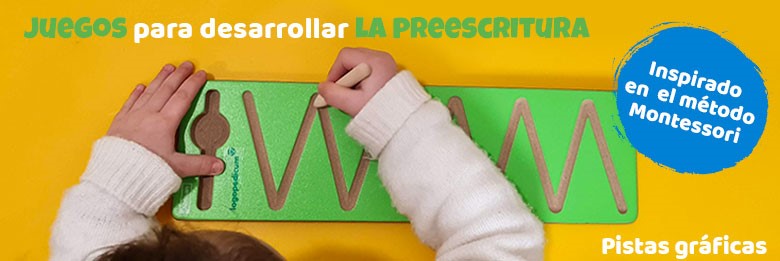
Aprender es modificar o adquirir nuevas habilidades, destrezas, conocimientos, conductas y valores mediante la experimentación, el estudio, la observación, el razonamiento o la instrucción. Múltiples y variados juegos disponibles hoy en día, desde los más clásicos hasta los más innovadores, pueden ser grandes herramientas para construir una variedad de aprendizajes: lectoescritura, matemáticas, razonamiento y resolución de problemas, etc. aportando motivación e interés a los jugadores. Más allá de la estimulación de las inteligencias múltiples, fomentaremos la autoestima, incentivaremos la cooperación y el trabajo en equipo y mejoraremos el comportamiento y la actitud, entre otros muchos aspectos.
 Auditory Memory Caterpillar
29,90 € (VAT not included)
Auditory Memory Caterpillar
29,90 € (VAT not included)
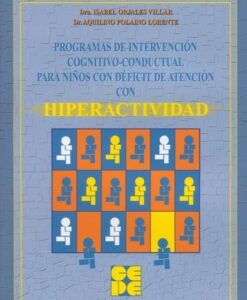 Cognitive behavioral intervention programs for children with attention deficit hyperactivity disorder (ADHD)
20,90 € (VAT not included)
Cognitive behavioral intervention programs for children with attention deficit hyperactivity disorder (ADHD)
20,90 € (VAT not included)
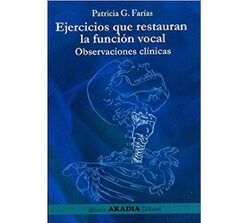 Ejercicios para restaurar la función vocal
36,50 € (VAT not included)
Ejercicios para restaurar la función vocal
36,50 € (VAT not included)
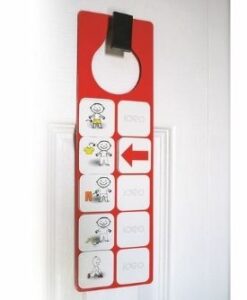 Vertical door support
8,90 € (VAT not included)
Vertical door support
8,90 € (VAT not included)
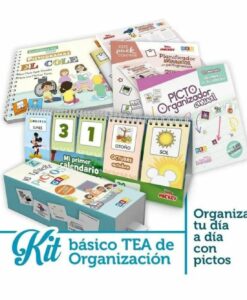 ASD Basic Kit - Organization
63,00 € (VAT not included)
ASD Basic Kit - Organization
63,00 € (VAT not included)
 Sensory reading marker - Fidget
4,00 € – 11,80 € (VAT not included)
Sensory reading marker - Fidget
4,00 € – 11,80 € (VAT not included)
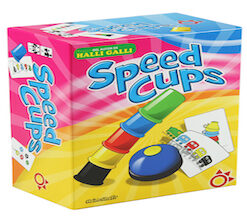 Be the fastest - Speed cups
18,90 € (VAT not included)
Be the fastest - Speed cups
18,90 € (VAT not included)
Showing 1–36 of 57 resultsSorted by latest
No account yet?
Create an Account'Los oídos mágicos de Lúa la Cacatúa' is ideal for helping young children in the early stages of learning to listen and speak . We accompany Lúa the Cockatoo, who is deaf - her ears don't work, so she wears cochlear implants to help her hear . Together we listen to the sounds she hears with her super magical ears.
"Lúa the Cockatoo likes the cow's moo ...but not the cat 's meow. The lion that roars bravely... to a crocodile that snaps its teeth".
Aimed at toddlers (ages 0 to 3) and early listeners (listening age 0 to 3), this 36-page book is bursting with color, illustrated throughout with colorful and bold images, ideal for little ones with inquiring minds.
The book is designed especially for families seeking a listening and spoken language outcome for their children. Children have to learn to listen before they learn to speak. For a child with normal hearing, this happens naturally and automatically; for a child who is deaf, who has accessed sound through hearing aids and/or cochlear implants, the process is usually more deliberate. The child has to first learn to pay attention to sound, then understand that sound has meaning, and finally that sound has power - he can use his voice to get what he wants, to express himself, and to join in with others.
Children will learn to imitate environmental sounds before they can say the appropriate words; thus, for example, a child will say "baa" before saying "sheep". This book allows children to listen to a series of common environmental sounds to "learn to listen" (the more often they hear them, the easier it will be for them to say them), as well as to hear the appropriate words. The book uses simple rhymes to link the fun "learning to listen" sounds.
The use of rhymes promotes language development and helps develop phonological awareness.
The book recognizes that learning to listen and speak is hard work for children who are deaf or hard of hearing, who often experience high levels of auditory fatigue. At the end of the day, as at the end of this book, it is wonderfully relaxing for them to take off their magic ears and enjoy total silence.
Text in Spanish. https://logopedicum.com/wp-content/uploads/2023/03/lua-la-cacatua-247x300.jpg 13.51 instock BooksHearing and languageHearing ImpairmentSPECIAL EDUCATIONAL NEEDS 0 0.00 0 https://logopedicum.com/wp-content/uploads/2023/03/lua-la-cacatua-247x300.jpg 25060648170245250232814250588 13.51 12.99 0.00 0.00 2023-04-19T09:19:59+02:00